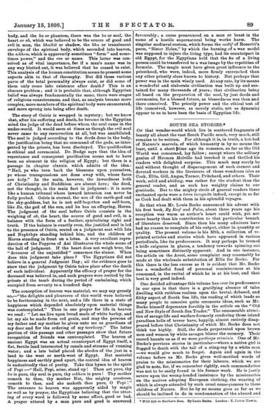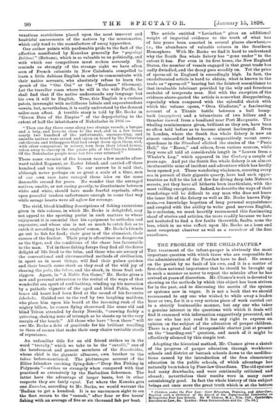SOUTH SEA STORIES.*
OF that wonder-world which lies in scattered fragments of beauty all about the vast South Pacific much, very much, still remains to be written. For although it is, in truth, a hot-bed of Nature's marvels, of which humanity is by no means the least, until a short [time ago its romance, as far as the Old World was concerned, lay fallow; except where the solitary genius of Herman Melville had touched it and thrilled his readers with delighted surprise. This much may surely be said without thought of disparagement of such earnest and devoted workers in the literature of those wondrous isles as Cook, Ellis, Gill, Angas, Turner, Pritchard, and others. Their work, solid and abiding, was rather for the student than the general reader, and as such has weighty claims to our gratitude. But to the mighty circle of general readers these enchanted spots were a terra incognita indeed, except in so far as Cook had dealt with them in his splendid voyages.
So that when Mr. Louis Becke announced his advent with his first book, By Beef and Palm, about three years ago his reception was warm as author's heart could wish, yet not more hearty than his contribution to that particular branch of literature deserved. Since then his many admirers have had no reason to complain of his output, either in quantity or quality. The present volume is his fifth, a collection of re- printed articles and stories which have appeared in various periodicals, like its predecessors. It may perhaps be termed a trifle exiguous in places, a tendency towards spinning out being sometimes distinctly apparent. And in one instance, the article on the Areoi, some complaint may reasonably be made at the wholesale substitution of Ellis for Becke. For this there is the less excuse as it is evident that Mr. Becke has a wonderful fund of personal reminiscences at his command, in the recital of which he is at his best, and that best is very good indeed.
One decided advantage this volume has over its predecessors in our eyes is that there is a gratifying absence of tales dwelling with ruthless realism upon the brutal, debased, and filthy aspect of South Sea life, the reading of which leads so many people to conceive quite erroneous ideas, such as Mr. Becke himself deprecates forcibly in the article on the "Old and New Style of South Sea Trader." The unnameable atroci- ties of savage life and warfare formerly rendering those island paradises hells of terror have, happily, almost entirely disap- peared before that Christianity of which Mr. Becke does not think too highly. Still, the deeds perpetrated upon brown men and women by white savages blister the memory. Their record haunts us as if we were particeps criminis. One of Mr. Becke's previous stories in particular—where a native girl is flogged to death with the tail of a sting-ray by a white man —we would give much to forget. Again and again in the volume before us Mr. Becke gives well-merited words of praise to the missionaries for their labours, which we are glad to note, for, if we remember rightly, such commendation was not to be easily found in his former work. He is justly severe upon the wrong-headed insistence by the missionaries on the natives adopting European clothing, the wearing of which is always attended by such cruel consequences to these children of Nature. But he by no means goes as far as we should be inclined to do in condemnation of the absurd and • Wild Life in Southern Seas. By Louis Beck.. London : T. Fisher Unwin.
vexatious restrictions placed upon the most innocent and healthful amusements of the natives by the missionaries, which only tend to the manufacture of smug hypocrites.
Our author points with pardonable pride to the fact of the affection manifested by Kanakas generally for " papolagi Belitani" (Britons), which is so valuable to us politically, and with which our competitors must reckon seriously. He reminds us strongly of the strange sight we have often seen of French colonists in New Caledonia compelled to learn a little dubious English in order to communicate with their native servants, who absolutely refuse to learn the speech of the " Oui Oui " or the " Tashman " (German). Let the traveller roam where he will in the wide Pacific, he shall find that if the native understands any language but his own it will be English. True, this English is a curious patois, inwrought with mellifluous labials and superabundant vowels, but, nevertheless, it is easily understood by the densest
sailor-man afloat. A terrible story is told by Mr. Becke in "Green Dots of the Empire" of the depopulating to the
extent of half the inhabitants of Nukulaelae in 1866 :—
" Then one day there came along two strange vessels, a barque and a brig, and hove-to close to the reef, and in a few hours nearly two hundred of the unfortunate, unsuspecting, and amiable natives were seized and taken on board by the Peruvian cut-throats and kidnappers that had swept down upon them, and, with other companions in misery, torn from their island homes, taken away to slavery in the guano pits of the Chincha Islands. Of the Nnkulaelae people none but two ever returned."
These same enemies of the human race a few months after- ward raided Rapanui, or Easter Island, and carried off three hundred and ten victims. To our sorrow be it said that, although never perhaps on so great a scale at a time, men of our own race have ravaged these isles on the same damnable errand for years. No wonder that the outraged natives, unable, or not oaring greatly, to discriminate between white and white, should have made fearful reprisals, often upon peaceful traders unfortunate enough to come that way while savage hearts were all aglow for revenge.
The vivid, blood-kindling descriptions of fishing excursions given in this volume, in which Mr. Becke is delightful, may not appeal to the sporting purist in such matters to whose enjoyment it is essential that his equipment be orthodox and expensive, and whose aim is not so much to catch fish as to catch it according to the anglers' canon. Mr. Becke's friends go out to fish for food ; their gear is of the clumsiest, their canoes of the frailest. Their prey is oftentimes as dangerous as the tiger, and the conditions of the chase less favourable to the man. Yet in these fishing forays they find all the fierce delight of life lived to the brim, and those who are aweary of the conventional and circumscribed methods of civilisation,
in sport as in most things, will find their pulses quicken and their breath come short as they read of the wild joy of chasing the pala, the takuo, and the shark, in those frail out- riggers. Again, in "A Noble Sea Game," Mr. Becke gives a new and personal attraction to the recital of the ways of that wonderful sea sport of surf-bathing, winding up his narration by a pathetic vignette of the aged and blind Pakia, whose brave old heart had been fired at the sound of his favourite fahaheke. Guided out to the reef by two laughing maidens, who place him upon his board at the incoming rush of the mighty billow, he comes flying shoreward like some old and blind Triton attended by dusky Nereids, "crowing feebly a
quivering, shaking note of triumph as he shoots up to the very margin of the beach." All those who have "been there" will owe Mr. Becke a debt of gratitude for his brilliant recalling to them of scenes that make their easy chairs veritable stools of repentance.
An unfamiliar title for an old friend strikes us in the word " trevally," which we take to be the " cavalle," one of the handsomest and gamest members of the Scombridae,
whose chief is the gigantic albacore, own brother to the !aka° before-mentioned. The picturesque account of the Ellice Islanders catching flying-fish—"Deep Sea Fishing in Polynesia "—strikes us strangely when compared with that practised so extensively by the Barbadian fishermen. The
latter have the advantage of larger boats, but in other respects they are fairly equal. Yet where the Kanaka gets one Exocetus, according to Mr. Becke, we would warrant the 'Badian to get a hundred. It is no uncommon sight to see the fleet return to the " canash," after four or five hours' fishing with an average of five or six thousand fish per boat. The article entitled " Leviathan " gives an additional weight of impartial evidence to the truth of what haa of late years been asserted in several places elsewhere,- i.e., the abundance of valuable cetacea in the Southern Hemisphere. With Mr. Becke we find it hard to understand why the South Sea whale fishery has "gone under" to the extent it has. For even in its first home, the New England States, the number of vessels engaged in that great trade has sadly dwindled, and the decay goes steadily on. Yet the price of sperm-oil in England is exceedingly high. In fact, the unadulterated article is hard to obtain, what is known to the trade as " sperm-oil " bearing but the faintest resemblance to that invaluable lubricant provided by the wily and ferocious cachalot of temperate seas. But with the exception of the evidence above-quoted the article is somewhat disappointing, especially when compared with the splendid sketch with which the volume opens, " Orca Gladiator," a fascinating account of a Titanic battle between a bull hump- back (megaptera) and a triumvirate of two killers and a thrasher viewed from a headland near Port Macquarie. The whaling reminiscences given, brilliant as they are, have been so often told before as to become almost hackneyed. Even in London, where the South Sea whale fishery is now an almost unheard-of industry, a comparatively recent corre- spondence in the Standard elicited the stories of the "Prude Hall," the "Essex," and others, from various sources, while they were all told at considerable length in "Leaves from a Whaler's Log," which appeared in the Century a couple of years ago. And yet the South Sea whale fishery is an almost inexhaustible mine of incident and adventure which has hardly been opened yet. Those wandering whalemen, scouring every sea in pursuit of their gigantic quarry, have had such oppor- tunities as fall to the lot of few for diving deep into Nature's secrets, yet they have all hitherto been inarticulate, with the most trifling exceptions. Indeed, to describe the ways of their wanderings will be difficult to any man who does not know the inner life of the fishery as well as Mr. Becke knows Poly- nesia,—a knowledge begotten of long personal acquaintance and coupled with the ability to write good nervous English, In conclusion, we must heartily recommend this fascinating sheaf of stories and articles, the more readily because we have not hesitated to find a few faults therewith, faults, none the less, which in no wise reflect upon Mr. Becke as a keen and most competent observer as well as a raconteur of the first excellence.



































 Previous page
Previous page